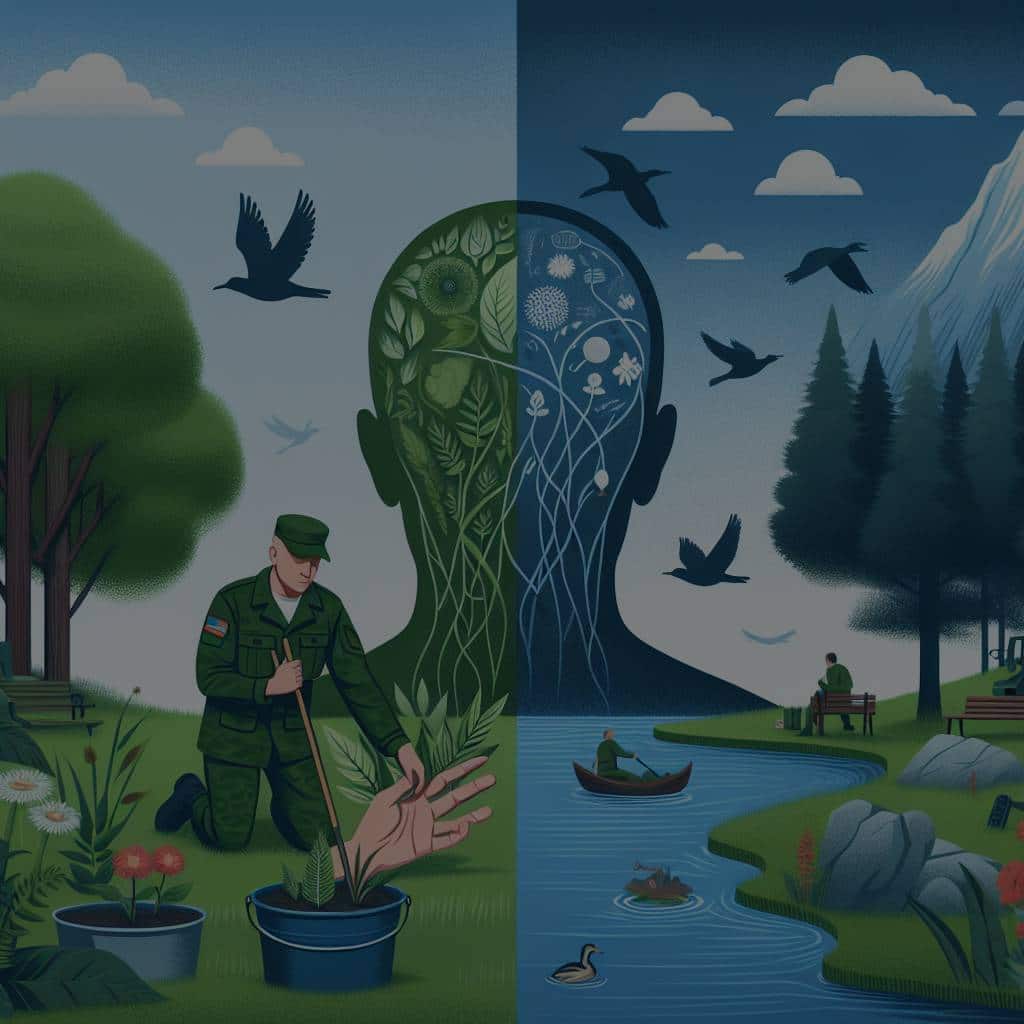How Can Nature-Based Therapies Alleviate Symptoms of PTSD in Veterans?

The harsh realities of war leave a profound impact on veterans. Among the prevailing consequential health issues, Post-Traumatic Stress Disorder (PTSD) takes a significant toll. PTSD is a debilitating stress condition that can occur after experiencing a traumatic event. Veterans with PTSD may suffer from intense nightmares, uncontrollable thoughts, and severe anxiety, which can profoundly impact their mental health and daily functioning. However, a beacon of hope has emerged from an unexpected realm: nature. A growing body of research reveals the therapeutic benefits of nature-based therapies (NBT) in alleviating PTSD symptoms among veterans. In this article, we will delve into how such treatments can help veterans regain control over their lives.
The Intricacies of PTSD Among Veterans
Understanding PTSD is the first step towards providing veterans with effective treatment. Studies indicate that as many as 20% of veterans from recent conflicts, such as those in Afghanistan and Iraq, suffer from PTSD. These numbers are a stark reminder of the mental health crisis among our military personnel.
A lire également : How to Reduce the Risk of Sports-Related Concussions in Youth Athletics?
PTSD manifests through a variety of symptoms that disturb the mental peace of the affected individuals. Veterans might experience flashbacks, avoidance behaviors, mood swings, and alterations in arousal and reactivity. Such symptoms can make it challenging for them to lead normal lives and maintain social connections.
The traditional treatment methods for PTSD include cognitive-behavioral therapy (CBT), eye movement desensitization and reprocessing (EMDR), and medication. While these methods demonstrate effectiveness in some cases, they might not provide relief to all veterans. This variability calls for alternative therapies that can cater to a broader range of individuals.
A lire également : What Are the Best Low-Impact Exercises for Pre-Natal Fitness?
Nature-Based Therapy: A Natural Healer
Nature-based therapy, or NBT, is an umbrella term for treatments that utilize the natural environment to promote health and well-being. Activities under NBT can vary widely, from horticulture therapy, where participants engage in gardening activities, to wilderness expeditions. The foundational belief of NBT is the idea that spending time outdoors in nature can have significant health benefits.
The healing power of nature has been recognized since ancient times. Recent research supports this belief, showing positive effects of NBT on mental health. Being in close contact with nature allows a person to experience a sense of calm and peace, reducing stress levels and promoting relaxation.
For veterans with PTSD, NBT offers a unique method of therapy that deviates from traditional clinical environments. It provides a comfortable, stress-free setting that can help veterans open up about their traumatic experiences.
The Impact of NBT on PTSD Symptoms
A growing body of scholarly research is demonstrating the effectiveness of NBT in alleviating PTSD symptoms in veterans. According to a study, veterans who participated in outdoor activities reported significant reductions in PTSD symptoms, depression, and anxiety levels. The calming effects of nature, combined with the physical exertion of outdoor activities, appear to contribute to this positive outcome.
One of the key elements of NBT that aids in PTSD treatment is its ability to help veterans manage their stress levels effectively. The tranquility of the natural environment assists in reducing hyperarousal symptoms, such as being easily startled or feeling tense. Moreover, engaging in structured outdoor activities offers a sense of routine and predictability, elements that can help veterans regain a feeling of control over their lives.
NBT also promotes mindfulness, a practice that involves focusing on the present moment without judgment. Mindfulness has been shown to help manage PTSD symptoms by reducing rumination over traumatic events. In a natural setting, veterans can practice mindfulness more easily, focusing on the sensations of the moment, like the rustle of leaves or the warmth of the sun.
The Practical Implementation of NBT and Future Perspectives
Given the potential benefits of NBT, its practical implementation is an area of increasing interest. The Veterans Health Administration (VHA) has already started implementing nature-oriented treatments in its programs. These include outdoor recreation therapy programs and green care farms, which provide therapeutic farming activities for veterans.
It is crucial to note, however, that NBT should not replace traditional therapy methods but rather complement them. The combination of traditional therapy, medication, and NBT can provide a comprehensive treatment plan tailored to the individual needs of each veteran.
Despite the promising results, more research is needed to establish the best practices for implementing NBT in PTSD treatment. Future studies should focus on determining which nature-based activities are most effective, the optimal duration and frequency of these activities, and how to best integrate them with existing treatment methods.
In the midst of the ongoing mental health crisis among veterans, NBT offers a promising alternative therapy. Harnessing the healing power of nature could be a key strategy in helping our veterans regain control over their lives. Through continued research and practical implementation, we can ensure that our veterans receive the comprehensive care they deserve, helping them to navigate the turbulent waters of PTSD and sail towards a calmer future.
The Connection Between NBT and Established Therapies
Given the growing evidence supporting the effectiveness of NBT in relieving PTSD symptoms, it is crucial to understand how NBT can fit within established treatment regimens. Many veterans with PTSD are already undergoing traditional treatments such as cognitive-behavioral therapy (CBT), eye movement desensitization and reprocessing (EMDR), and medication. Researchers are now interested in investigating how nature-based therapies can complement these existing strategies.
A study on therapy gardens, found on Google Scholar, highlighted the potential of such environments to complement exposure therapy, a form of CBT that helps patients face and control their fear. The study suggested that the calm and non-threatening nature of therapy gardens can be beneficial in exposure therapy, making it more tolerable for veterans who have experienced traumatic events.
NBT can also work well with trauma-focused cognitive-behavioral therapy (TF-CBT), a specific type of CBT used for PTSD treatment. TF-CBT typically involves activities that help patients confront their traumatic memories and manage their triggers. In the tranquil setting of a nature-based environment, these activities can be less stressful and more manageable.
Lastly, integrating NBT with medication-based treatments could potentially enhance overall outcomes. The calming effects of nature might amplify the benefits of PTSD medication, helping veterans achieve better control over their symptoms. For instance, nature exposure could potentially enhance the effects of selective serotonin reuptake inhibitors (SSRIs), a commonly prescribed medication for PTSD that works by boosting the levels of serotonin, a chemical in the brain that helps regulate mood.
Conclusion: Nourishing Hope with Nature
The mental health crisis among veterans is undeniable, but the rays of hope are emerging from our very own Mother Nature. Nature-based therapies have shown promise in alleviating symptoms of PTSD among veterans, offering them a reprieve from the chaos of their minds. By embracing the tranquility of nature, veterans can find a safe space to confront their traumatic experiences, manage their stress, and ultimately regain control over their lives.
As we move forward, it is essential to continue exploring this unique therapy method. By conducting further research, we can gain a better understanding of how nature-based therapies work and how they can best be integrated with existing treatment methods. It is equally important to promote public awareness about these therapies, to ensure that veterans have access to all possible options for their care.
In the vast literature of PubMed Google, evidence-based studies on the therapeutic effects of nature are growing. However, understanding the specifics of NBT, such as the optimal duration and frequency of nature exposure, the most effective types of nature-based activities, and how to integrate them seamlessly into existing treatment regimes, requires further exploration.
The journey to recovery from PTSD is undeniably challenging. But with the soothing whisper of the wind, the rustling leaves underfoot, and the warmth of the sun, nature stands as a steadfast companion to our veterans in their healing journey. Harnessing the healing power of nature, we can offer our veterans a more holistic and comprehensive care plan, helping them navigate the turbulent waters of PTSD towards the shores of peace and tranquility.
